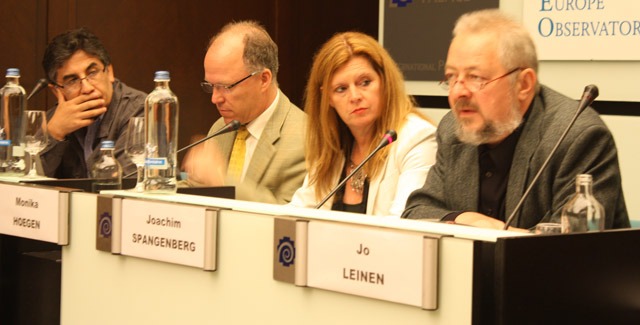In the run-up to the United Nations Conference of Sustainable Development (UNCSD), Rio+20, June 20th-22nd; Friends of the Earth Europe, Corporate Europe Observatory (CEO) and The Transnational Institute organised a public debate on the concept of the ‘green economy’ currently being promoted by the European Union and the United Nations ahead of talks.
The ‘green economy’ is being presented as a solution to the world’s environmental and social challenges. But what does this concept involve and what does it imply for policies in the EU and beyond? Does it provide much needed solutions to protect the environment and promote a real shift towards sustainable economies? Who will benefit from the green economy and why has the concept attracted criticisms?
The debate brought spokespeople from Focus on the Global South, the Sustainable Europe Research Institute, the European Parliament and the European Commission.
Hugo-Maria Schally, Head of Multilateral Environmental Agreements, DG Environment, argued that considering the environment as a “natural capital” is the only way to improve governance of global resources – leading to a “win-win situation” that removes the gap between Northern and Southern countries.
MEP Jo Leinen (S&D) was more measured on the benefits of commercialisation of nature, and put emphasis on the need for a technological shift, and the need to put a price on natural resources as a way to achieve better consumption models.
Joachim Spangenberg, vice president of the Sustainable Europe Research Institute and Pablo Solón, director of Focus on the Global South, both expressed concerns about including private commercial interests in the global negotiations.
Mr. Spangenberg concluded that the optimum reached by market solutions remains an economic optimum, not a social and environmental one. Mr. Solón took a strong stand against a ‘green economy’ – privatising natural systems, and a reliance upon market rules would only lead to failure at Rio+20.
Friends of the Earth Europe is campaigning to limit the excessive influence of multinational corporations on global negotiations and decision-making processes, which we fear result in policies that do not necessarily serve the public interest[C1] . Privileged access for business promoting a so-called green economy based on market mechanisms will further worsen the global environmental crisis and its consequences on people without tackling its origins and the role of business in creating it.
The “Reclaim the UN from corporate capture” campaign launched an online public petition asking UN Secretary General Ban Ki-moon to take the steps needed to reclaim the UN from corporate capture. Putting ‘green economy’ at the core of the Rio+20 summit is another example of the growing role given to corporate groups in the UN, which increasingly results in public policies that do not necessarily serve the public interest but rather the pockets of a select few.







